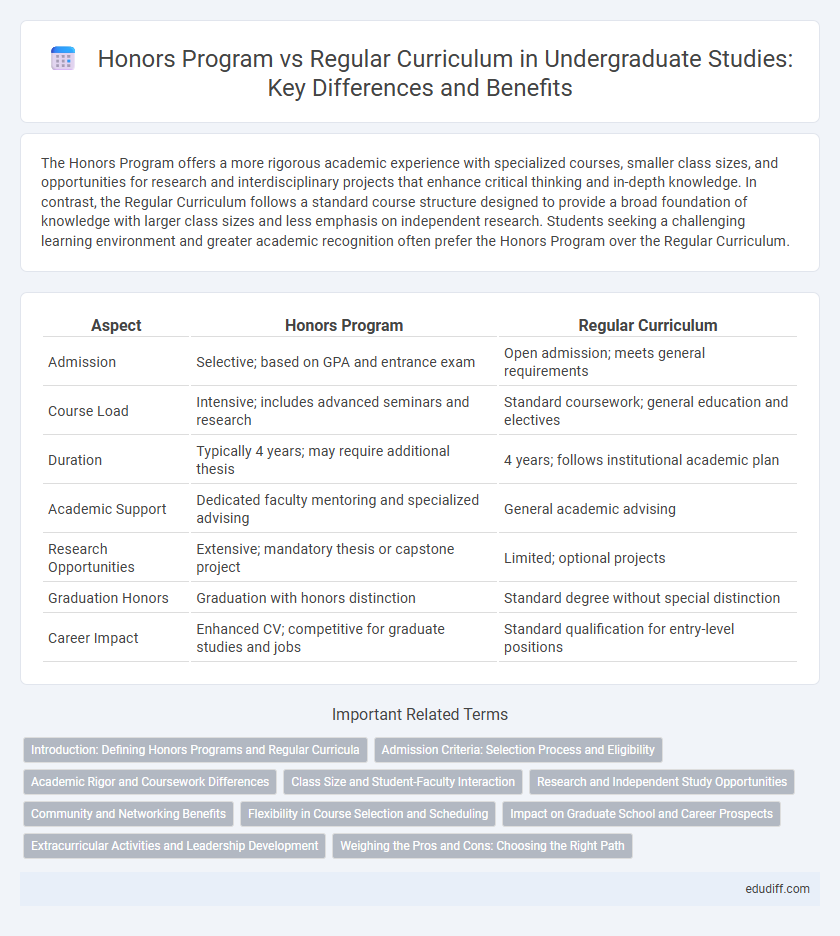The Honors Program offers a more rigorous academic experience with specialized courses, smaller class sizes, and opportunities for research and interdisciplinary projects that enhance critical thinking and in-depth knowledge. In contrast, the Regular Curriculum follows a standard course structure designed to provide a broad foundation of knowledge with larger class sizes and less emphasis on independent research. Students seeking a challenging learning environment and greater academic recognition often prefer the Honors Program over the Regular Curriculum.
Table of Comparison
| Aspect | Honors Program | Regular Curriculum |
|---|---|---|
| Admission | Selective; based on GPA and entrance exam | Open admission; meets general requirements |
| Course Load | Intensive; includes advanced seminars and research | Standard coursework; general education and electives |
| Duration | Typically 4 years; may require additional thesis | 4 years; follows institutional academic plan |
| Academic Support | Dedicated faculty mentoring and specialized advising | General academic advising |
| Research Opportunities | Extensive; mandatory thesis or capstone project | Limited; optional projects |
| Graduation Honors | Graduation with honors distinction | Standard degree without special distinction |
| Career Impact | Enhanced CV; competitive for graduate studies and jobs | Standard qualification for entry-level positions |
Introduction: Defining Honors Programs and Regular Curricula
Honors programs typically offer a more challenging and enriched academic experience compared to regular curricula, emphasizing advanced coursework, research opportunities, and smaller class sizes. Regular curricula provide a standard academic path designed to meet general educational requirements and accommodate a broader student population. These distinctions guide students in choosing between a rigorous, specialized education and a more flexible, conventional academic track.
Admission Criteria: Selection Process and Eligibility
Honors Program admission requires a higher GPA, competitive standardized test scores, and a rigorous selection process including interviews and recommendation letters. Regular curriculum eligibility typically involves meeting basic high school graduation requirements and minimum entrance exam scores, with a more straightforward application review. The Honors Program prioritizes academic excellence and leadership potential, distinguishing its admissions from the regular track.
Academic Rigor and Coursework Differences
The Honors Program offers enhanced academic rigor through advanced coursework, smaller class sizes, and opportunities for research projects, fostering critical thinking and specialized knowledge. Regular curriculum maintains foundational academic standards with broader course selections aimed at general education and degree requirements. Students in Honors Programs often engage in interdisciplinary studies and receive closer faculty mentorship compared to the more structured and generalized Regular Curriculum.
Class Size and Student-Faculty Interaction
Honors Programs typically offer smaller class sizes, averaging 15 to 20 students, which fosters closer student-faculty interaction and personalized mentorship. Regular curricula often have larger classes, sometimes exceeding 50 students, limiting opportunities for one-on-one engagement with professors. Enhanced student-faculty interaction in Honors Programs contributes to deeper academic discussions and tailored feedback.
Research and Independent Study Opportunities
The Honors Program offers enhanced research opportunities and emphasizes independent study projects, allowing undergraduate students to engage deeply with their field and contribute original findings. In contrast, the Regular Curriculum provides a structured learning path with limited scope for personalized research, focusing more on foundational knowledge acquisition. Students in the Honors Program benefit from mentorship by faculty researchers, access to specialized resources, and a curriculum that promotes critical thinking and academic rigor.
Community and Networking Benefits
The Honors Program fosters a tight-knit community of high-achieving students, providing exclusive networking opportunities with faculty, alumni, and industry professionals that are less accessible in the Regular Curriculum. Participation in honors seminars, research projects, and specialized events cultivates meaningful connections and mentorships, enhancing both academic and career prospects. These community and networking benefits create a supportive environment that promotes collaboration, leadership, and long-term professional growth.
Flexibility in Course Selection and Scheduling
The Honors Program offers greater flexibility in course selection and scheduling, allowing students to tailor their academic paths with advanced seminars and interdisciplinary options. Regular curriculum often follows a more rigid, predefined course sequence with limited scheduling adjustments. This flexibility in the Honors Program supports deeper specialization and better alignment with individual academic and career goals.
Impact on Graduate School and Career Prospects
Honors programs enhance graduate school admission chances by offering rigorous coursework, research opportunities, and close faculty mentorship, which foster critical thinking and specialized knowledge. Employers value honors graduates for their demonstrated commitment, advanced skills, and problem-solving abilities, often leading to better career prospects and higher starting salaries. In contrast, a regular curriculum provides a solid foundation but may lack the distinctive experiences that distinguish candidates in competitive academic and professional environments.
Extracurricular Activities and Leadership Development
The Honors Program offers enhanced opportunities for leadership development through exclusive extracurricular activities such as specialized seminars, leadership workshops, and research projects that foster critical thinking and collaboration skills. Regular curriculum students participate in general extracurricular activities that provide foundational experience but with less emphasis on leadership roles and personalized growth. Participation in the Honors Program significantly increases the likelihood of securing leadership positions in student organizations and networking with faculty mentors, which can enhance career prospects after graduation.
Weighing the Pros and Cons: Choosing the Right Path
The Honors Program offers enriched academic challenges and smaller class sizes, fostering critical thinking and research opportunities that can enhance graduate school prospects. The regular curriculum provides a broader selection of courses and a more flexible schedule, accommodating diverse interests and part-time commitments. Students must balance the intensity and exclusivity of the Honors Program against the adaptability and variety found in the regular curriculum to select the best fit for their academic goals and lifestyle.
Honors Program vs Regular Curriculum Infographic

 edudiff.com
edudiff.com